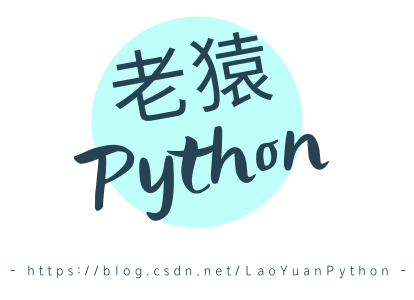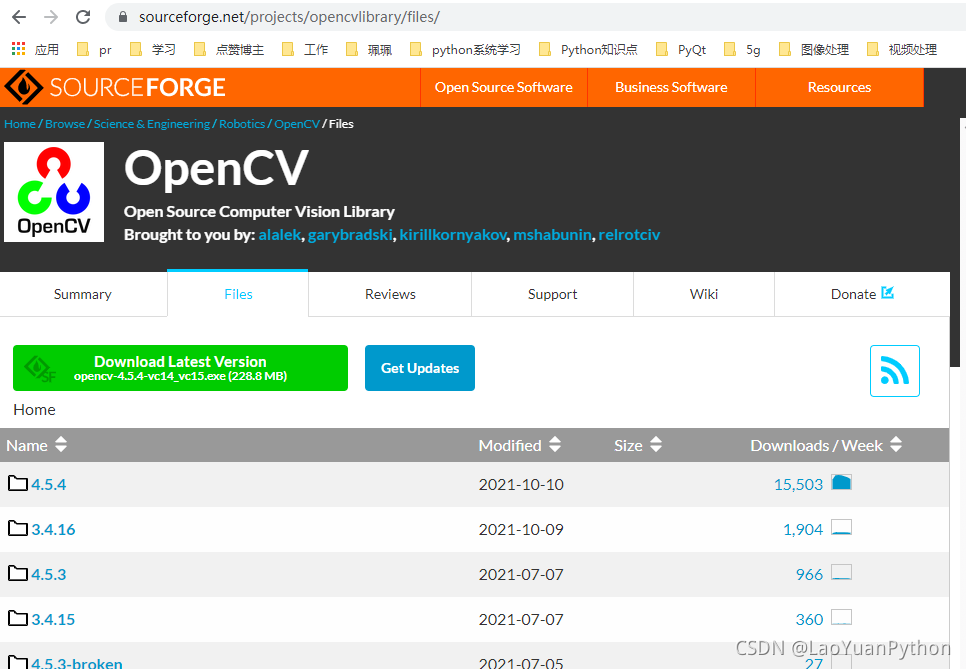- 1asp.net905-二次元网站系统#毕业设计_关于二次元图片的web应用系统开发
- 2CVPR2018 paper list_cvpr2018分类
- 3【幻兽帕鲁/Palworld】2024年超简单部署幻兽帕鲁服务器攻略
- 4IntelliJ IDEA 2023 for mac Java语言开发集成环境 开发工具
- 5阿里云Kubernetes容器服务上体验Knative_knative serving 支持 nacos
- 6NAT技术详解
- 7TCP/IP协议以及UDP(超详细,看这一篇就够了)_tcpip udp 数据包过程
- 8Metastealer 接棒 Racoon stealer 进行窃密_user-agent: cpp-httplib/0.10.4
- 9CentOS 7 双网卡绑定热备 —— 筑梦之路_centos7 lacp mode几种模式
- 10云服务器宝塔面板的安装_宝塔安装代码
OpenCV自适应直方图均衡CLAHE C++源代码分享_opencv clahe c++
赞
踩

一、引言
最近收到几个网友提供OpenCV中CLAHE的源代码的请求,在此直接将OpenCV4.54版本CLAHE.CPP的源码分享出来。
二、OpenCV源代码的下载
下载地址:https://sourceforge.net/projects/opencvlibrary/files/
有3.4.10–4.5.4的版本,但下载很慢,老猿费了很大的劲,大家可以考虑专门的下载工具下载。如果实在下不下来,请关注老猿Python的微信公号给老猿发消息。
三、CLAHE C++源代码
/*M/// // // IMPORTANT: READ BEFORE DOWNLOADING, COPYING, INSTALLING OR USING. // // By downloading, copying, installing or using the software you agree to this license. // If you do not agree to this license, do not download, install, // copy or use the software. // // // License Agreement // For Open Source Computer Vision Library // // Copyright (C) 2013, NVIDIA Corporation, all rights reserved. // Copyright (C) 2014, Itseez Inc., all rights reserved. // Third party copyrights are property of their respective owners. // // Redistribution and use in source and binary forms, with or without modification, // are permitted provided that the following conditions are met: // // * Redistribution's of source code must retain the above copyright notice, // this list of conditions and the following disclaimer. // // * Redistribution's in binary form must reproduce the above copyright notice, // this list of conditions and the following disclaimer in the documentation // and/or other materials provided with the distribution. // // * The name of the copyright holders may not be used to endorse or promote products // derived from this software without specific prior written permission. // // This software is provided by the copyright holders and contributors "as is" and // any express or implied warranties, including, but not limited to, the implied // warranties of merchantability and fitness for a particular purpose are disclaimed. // In no event shall the copyright holders or contributors be liable for any direct, // indirect, incidental, special, exemplary, or consequential damages // (including, but not limited to, procurement of substitute goods or services; // loss of use, data, or profits; or business interruption) however caused // and on any theory of liability, whether in contract, strict liability, // or tort (including negligence or otherwise) arising in any way out of // the use of this software, even if advised of the possibility of such damage. // //M*/ #include "precomp.hpp" #include "opencl_kernels_imgproc.hpp" // ---------------------------------------------------------------------- // CLAHE #ifdef HAVE_OPENCL namespace clahe { static bool calcLut(cv::InputArray _src, cv::OutputArray _dst, const int tilesX, const int tilesY, const cv::Size tileSize, const int clipLimit, const float lutScale) { cv::ocl::Kernel k("calcLut", cv::ocl::imgproc::clahe_oclsrc); if(k.empty()) return false; cv::UMat src = _src.getUMat(); _dst.create(tilesX * tilesY, 256, CV_8UC1); cv::UMat dst = _dst.getUMat(); int tile_size[2]; tile_size[0] = tileSize.width; tile_size[1] = tileSize.height; size_t localThreads[3] = { 32, 8, 1 }; size_t globalThreads[3] = { tilesX * localThreads[0], tilesY * localThreads[1], 1 }; int idx = 0; idx = k.set(idx, cv::ocl::KernelArg::ReadOnlyNoSize(src)); idx = k.set(idx, cv::ocl::KernelArg::WriteOnlyNoSize(dst)); idx = k.set(idx, tile_size); idx = k.set(idx, tilesX); idx = k.set(idx, clipLimit); k.set(idx, lutScale); return k.run(2, globalThreads, localThreads, false); } static bool transform(cv::InputArray _src, cv::OutputArray _dst, cv::InputArray _lut, const int tilesX, const int tilesY, const cv::Size & tileSize) { cv::ocl::Kernel k("transform", cv::ocl::imgproc::clahe_oclsrc); if(k.empty()) return false; int tile_size[2]; tile_size[0] = tileSize.width; tile_size[1] = tileSize.height; cv::UMat src = _src.getUMat(); _dst.create(src.size(), src.type()); cv::UMat dst = _dst.getUMat(); cv::UMat lut = _lut.getUMat(); size_t localThreads[3] = { 32, 8, 1 }; size_t globalThreads[3] = { (size_t)src.cols, (size_t)src.rows, 1 }; int idx = 0; idx = k.set(idx, cv::ocl::KernelArg::ReadOnlyNoSize(src)); idx = k.set(idx, cv::ocl::KernelArg::WriteOnlyNoSize(dst)); idx = k.set(idx, cv::ocl::KernelArg::ReadOnlyNoSize(lut)); idx = k.set(idx, src.cols); idx = k.set(idx, src.rows); idx = k.set(idx, tile_size); idx = k.set(idx, tilesX); k.set(idx, tilesY); return k.run(2, globalThreads, localThreads, false); } } #endif namespace { template <class T, int histSize, int shift> class CLAHE_CalcLut_Body : public cv::ParallelLoopBody { public: CLAHE_CalcLut_Body(const cv::Mat& src, const cv::Mat& lut, const cv::Size& tileSize, const int& tilesX, const int& clipLimit, const float& lutScale) : src_(src), lut_(lut), tileSize_(tileSize), tilesX_(tilesX), clipLimit_(clipLimit), lutScale_(lutScale) { } void operator ()(const cv::Range& range) const CV_OVERRIDE; private: cv::Mat src_; mutable cv::Mat lut_; cv::Size tileSize_; int tilesX_; int clipLimit_; float lutScale_; }; template <class T, int histSize, int shift> void CLAHE_CalcLut_Body<T,histSize,shift>::operator ()(const cv::Range& range) const { T* tileLut = lut_.ptr<T>(range.start); const size_t lut_step = lut_.step / sizeof(T); for (int k = range.start; k < range.end; ++k, tileLut += lut_step) { const int ty = k / tilesX_; const int tx = k % tilesX_; // retrieve tile submatrix cv::Rect tileROI; tileROI.x = tx * tileSize_.width; tileROI.y = ty * tileSize_.height; tileROI.width = tileSize_.width; tileROI.height = tileSize_.height; const cv::Mat tile = src_(tileROI); // calc histogram cv::AutoBuffer<int> _tileHist(histSize); int* tileHist = _tileHist.data(); std::fill(tileHist, tileHist + histSize, 0); int height = tileROI.height; const size_t sstep = src_.step / sizeof(T); for (const T* ptr = tile.ptr<T>(0); height--; ptr += sstep) { int x = 0; for (; x <= tileROI.width - 4; x += 4) { int t0 = ptr[x], t1 = ptr[x+1]; tileHist[t0 >> shift]++; tileHist[t1 >> shift]++; t0 = ptr[x+2]; t1 = ptr[x+3]; tileHist[t0 >> shift]++; tileHist[t1 >> shift]++; } for (; x < tileROI.width; ++x) tileHist[ptr[x] >> shift]++; } // clip histogram if (clipLimit_ > 0) { // how many pixels were clipped int clipped = 0; for (int i = 0; i < histSize; ++i) { if (tileHist[i] > clipLimit_) { clipped += tileHist[i] - clipLimit_; tileHist[i] = clipLimit_; } } // redistribute clipped pixels int redistBatch = clipped / histSize; int residual = clipped - redistBatch * histSize; for (int i = 0; i < histSize; ++i) tileHist[i] += redistBatch; if (residual != 0) { int residualStep = MAX(histSize / residual, 1); for (int i = 0; i < histSize && residual > 0; i += residualStep, residual--) tileHist[i]++; } } // calc Lut int sum = 0; for (int i = 0; i < histSize; ++i) { sum += tileHist[i]; tileLut[i] = cv::saturate_cast<T>(sum * lutScale_); } } } template <class T, int shift> class CLAHE_Interpolation_Body : public cv::ParallelLoopBody { public: CLAHE_Interpolation_Body(const cv::Mat& src, const cv::Mat& dst, const cv::Mat& lut, const cv::Size& tileSize, const int& tilesX, const int& tilesY) : src_(src), dst_(dst), lut_(lut), tileSize_(tileSize), tilesX_(tilesX), tilesY_(tilesY) { buf.allocate(src.cols << 2); ind1_p = buf.data(); ind2_p = ind1_p + src.cols; xa_p = (float *)(ind2_p + src.cols); xa1_p = xa_p + src.cols; int lut_step = static_cast<int>(lut_.step / sizeof(T)); float inv_tw = 1.0f / tileSize_.width; for (int x = 0; x < src.cols; ++x) { float txf = x * inv_tw - 0.5f; int tx1 = cvFloor(txf); int tx2 = tx1 + 1; xa_p[x] = txf - tx1; xa1_p[x] = 1.0f - xa_p[x]; tx1 = std::max(tx1, 0); tx2 = std::min(tx2, tilesX_ - 1); ind1_p[x] = tx1 * lut_step; ind2_p[x] = tx2 * lut_step; } } void operator ()(const cv::Range& range) const CV_OVERRIDE; private: cv::Mat src_; mutable cv::Mat dst_; cv::Mat lut_; cv::Size tileSize_; int tilesX_; int tilesY_; cv::AutoBuffer<int> buf; int * ind1_p, * ind2_p; float * xa_p, * xa1_p; }; template <class T, int shift> void CLAHE_Interpolation_Body<T, shift>::operator ()(const cv::Range& range) const { float inv_th = 1.0f / tileSize_.height; for (int y = range.start; y < range.end; ++y) { const T* srcRow = src_.ptr<T>(y); T* dstRow = dst_.ptr<T>(y); float tyf = y * inv_th - 0.5f; int ty1 = cvFloor(tyf); int ty2 = ty1 + 1; float ya = tyf - ty1, ya1 = 1.0f - ya; ty1 = std::max(ty1, 0); ty2 = std::min(ty2, tilesY_ - 1); const T* lutPlane1 = lut_.ptr<T>(ty1 * tilesX_); const T* lutPlane2 = lut_.ptr<T>(ty2 * tilesX_); for (int x = 0; x < src_.cols; ++x) { int srcVal = srcRow[x] >> shift; int ind1 = ind1_p[x] + srcVal; int ind2 = ind2_p[x] + srcVal; float res = (lutPlane1[ind1] * xa1_p[x] + lutPlane1[ind2] * xa_p[x]) * ya1 + (lutPlane2[ind1] * xa1_p[x] + lutPlane2[ind2] * xa_p[x]) * ya; dstRow[x] = cv::saturate_cast<T>(res) << shift; } } } class CLAHE_Impl CV_FINAL : public cv::CLAHE { public: CLAHE_Impl(double clipLimit = 40.0, int tilesX = 8, int tilesY = 8); void apply(cv::InputArray src, cv::OutputArray dst) CV_OVERRIDE; void setClipLimit(double clipLimit) CV_OVERRIDE; double getClipLimit() const CV_OVERRIDE; void setTilesGridSize(cv::Size tileGridSize) CV_OVERRIDE; cv::Size getTilesGridSize() const CV_OVERRIDE; void collectGarbage() CV_OVERRIDE; private: double clipLimit_; int tilesX_; int tilesY_; cv::Mat srcExt_; cv::Mat lut_; #ifdef HAVE_OPENCL cv::UMat usrcExt_; cv::UMat ulut_; #endif }; CLAHE_Impl::CLAHE_Impl(double clipLimit, int tilesX, int tilesY) : clipLimit_(clipLimit), tilesX_(tilesX), tilesY_(tilesY) { } void CLAHE_Impl::apply(cv::InputArray _src, cv::OutputArray _dst) { CV_INSTRUMENT_REGION(); CV_Assert( _src.type() == CV_8UC1 || _src.type() == CV_16UC1 ); #ifdef HAVE_OPENCL bool useOpenCL = cv::ocl::isOpenCLActivated() && _src.isUMat() && _src.dims()<=2 && _src.type() == CV_8UC1; #endif int histSize = _src.type() == CV_8UC1 ? 256 : 65536; cv::Size tileSize; cv::_InputArray _srcForLut; if (_src.size().width % tilesX_ == 0 && _src.size().height % tilesY_ == 0) { tileSize = cv::Size(_src.size().width / tilesX_, _src.size().height / tilesY_); _srcForLut = _src; } else { #ifdef HAVE_OPENCL if(useOpenCL) { cv::copyMakeBorder(_src, usrcExt_, 0, tilesY_ - (_src.size().height % tilesY_), 0, tilesX_ - (_src.size().width % tilesX_), cv::BORDER_REFLECT_101); tileSize = cv::Size(usrcExt_.size().width / tilesX_, usrcExt_.size().height / tilesY_); _srcForLut = usrcExt_; } else #endif { cv::copyMakeBorder(_src, srcExt_, 0, tilesY_ - (_src.size().height % tilesY_), 0, tilesX_ - (_src.size().width % tilesX_), cv::BORDER_REFLECT_101); tileSize = cv::Size(srcExt_.size().width / tilesX_, srcExt_.size().height / tilesY_); _srcForLut = srcExt_; } } const int tileSizeTotal = tileSize.area(); const float lutScale = static_cast<float>(histSize - 1) / tileSizeTotal; int clipLimit = 0; if (clipLimit_ > 0.0) { clipLimit = static_cast<int>(clipLimit_ * tileSizeTotal / histSize); clipLimit = std::max(clipLimit, 1); } #ifdef HAVE_OPENCL if (useOpenCL && clahe::calcLut(_srcForLut, ulut_, tilesX_, tilesY_, tileSize, clipLimit, lutScale) ) if( clahe::transform(_src, _dst, ulut_, tilesX_, tilesY_, tileSize) ) { CV_IMPL_ADD(CV_IMPL_OCL); return; } #endif cv::Mat src = _src.getMat(); _dst.create( src.size(), src.type() ); cv::Mat dst = _dst.getMat(); cv::Mat srcForLut = _srcForLut.getMat(); lut_.create(tilesX_ * tilesY_, histSize, _src.type()); cv::Ptr<cv::ParallelLoopBody> calcLutBody; if (_src.type() == CV_8UC1) calcLutBody = cv::makePtr<CLAHE_CalcLut_Body<uchar, 256, 0> >(srcForLut, lut_, tileSize, tilesX_, clipLimit, lutScale); else if (_src.type() == CV_16UC1) calcLutBody = cv::makePtr<CLAHE_CalcLut_Body<ushort, 65536, 0> >(srcForLut, lut_, tileSize, tilesX_, clipLimit, lutScale); else CV_Error( CV_StsBadArg, "Unsupported type" ); cv::parallel_for_(cv::Range(0, tilesX_ * tilesY_), *calcLutBody); cv::Ptr<cv::ParallelLoopBody> interpolationBody; if (_src.type() == CV_8UC1) interpolationBody = cv::makePtr<CLAHE_Interpolation_Body<uchar, 0> >(src, dst, lut_, tileSize, tilesX_, tilesY_); else if (_src.type() == CV_16UC1) interpolationBody = cv::makePtr<CLAHE_Interpolation_Body<ushort, 0> >(src, dst, lut_, tileSize, tilesX_, tilesY_); cv::parallel_for_(cv::Range(0, src.rows), *interpolationBody); } void CLAHE_Impl::setClipLimit(double clipLimit) { clipLimit_ = clipLimit; } double CLAHE_Impl::getClipLimit() const { return clipLimit_; } void CLAHE_Impl::setTilesGridSize(cv::Size tileGridSize) { tilesX_ = tileGridSize.width; tilesY_ = tileGridSize.height; } cv::Size CLAHE_Impl::getTilesGridSize() const { return cv::Size(tilesX_, tilesY_); } void CLAHE_Impl::collectGarbage() { srcExt_.release(); lut_.release(); #ifdef HAVE_OPENCL usrcExt_.release(); ulut_.release(); #endif } } cv::Ptr<cv::CLAHE> cv::createCLAHE(double clipLimit, cv::Size tileGridSize) { return makePtr<CLAHE_Impl>(clipLimit, tileGridSize.width, tileGridSize.height); }
- 1
- 2
- 3
- 4
- 5
- 6
- 7
- 8
- 9
- 10
- 11
- 12
- 13
- 14
- 15
- 16
- 17
- 18
- 19
- 20
- 21
- 22
- 23
- 24
- 25
- 26
- 27
- 28
- 29
- 30
- 31
- 32
- 33
- 34
- 35
- 36
- 37
- 38
- 39
- 40
- 41
- 42
- 43
- 44
- 45
- 46
- 47
- 48
- 49
- 50
- 51
- 52
- 53
- 54
- 55
- 56
- 57
- 58
- 59
- 60
- 61
- 62
- 63
- 64
- 65
- 66
- 67
- 68
- 69
- 70
- 71
- 72
- 73
- 74
- 75
- 76
- 77
- 78
- 79
- 80
- 81
- 82
- 83
- 84
- 85
- 86
- 87
- 88
- 89
- 90
- 91
- 92
- 93
- 94
- 95
- 96
- 97
- 98
- 99
- 100
- 101
- 102
- 103
- 104
- 105
- 106
- 107
- 108
- 109
- 110
- 111
- 112
- 113
- 114
- 115
- 116
- 117
- 118
- 119
- 120
- 121
- 122
- 123
- 124
- 125
- 126
- 127
- 128
- 129
- 130
- 131
- 132
- 133
- 134
- 135
- 136
- 137
- 138
- 139
- 140
- 141
- 142
- 143
- 144
- 145
- 146
- 147
- 148
- 149
- 150
- 151
- 152
- 153
- 154
- 155
- 156
- 157
- 158
- 159
- 160
- 161
- 162
- 163
- 164
- 165
- 166
- 167
- 168
- 169
- 170
- 171
- 172
- 173
- 174
- 175
- 176
- 177
- 178
- 179
- 180
- 181
- 182
- 183
- 184
- 185
- 186
- 187
- 188
- 189
- 190
- 191
- 192
- 193
- 194
- 195
- 196
- 197
- 198
- 199
- 200
- 201
- 202
- 203
- 204
- 205
- 206
- 207
- 208
- 209
- 210
- 211
- 212
- 213
- 214
- 215
- 216
- 217
- 218
- 219
- 220
- 221
- 222
- 223
- 224
- 225
- 226
- 227
- 228
- 229
- 230
- 231
- 232
- 233
- 234
- 235
- 236
- 237
- 238
- 239
- 240
- 241
- 242
- 243
- 244
- 245
- 246
- 247
- 248
- 249
- 250
- 251
- 252
- 253
- 254
- 255
- 256
- 257
- 258
- 259
- 260
- 261
- 262
- 263
- 264
- 265
- 266
- 267
- 268
- 269
- 270
- 271
- 272
- 273
- 274
- 275
- 276
- 277
- 278
- 279
- 280
- 281
- 282
- 283
- 284
- 285
- 286
- 287
- 288
- 289
- 290
- 291
- 292
- 293
- 294
- 295
- 296
- 297
- 298
- 299
- 300
- 301
- 302
- 303
- 304
- 305
- 306
- 307
- 308
- 309
- 310
- 311
- 312
- 313
- 314
- 315
- 316
- 317
- 318
- 319
- 320
- 321
- 322
- 323
- 324
- 325
- 326
- 327
- 328
- 329
- 330
- 331
- 332
- 333
- 334
- 335
- 336
- 337
- 338
- 339
- 340
- 341
- 342
- 343
- 344
- 345
- 346
- 347
- 348
- 349
- 350
- 351
- 352
- 353
- 354
- 355
- 356
- 357
- 358
- 359
- 360
- 361
- 362
- 363
- 364
- 365
- 366
- 367
- 368
- 369
- 370
- 371
- 372
- 373
- 374
- 375
- 376
- 377
- 378
- 379
- 380
- 381
- 382
- 383
- 384
- 385
- 386
- 387
- 388
- 389
- 390
- 391
- 392
- 393
- 394
- 395
- 396
- 397
- 398
- 399
- 400
- 401
- 402
- 403
- 404
- 405
- 406
- 407
- 408
- 409
- 410
- 411
- 412
- 413
- 414
- 415
- 416
- 417
- 418
- 419
- 420
- 421
- 422
- 423
- 424
- 425
- 426
- 427
- 428
- 429
- 430
- 431
- 432
- 433
- 434
- 435
- 436
- 437
- 438
- 439
- 440
- 441
- 442
- 443
- 444
- 445
- 446
- 447
- 448
- 449
- 450
- 451
- 452
- 453
- 454
- 455
- 456
- 457
- 458
- 459
- 460
- 461
- 462
- 463
- 464
- 465
- 466
- 467
如对文章内容存在疑问,可在博客评论区留言,或关注:老猿Python 微信公号发消息咨询。

更多图像直方图处理的内容请参考《《数字图像处理》第三章学习总结感悟2:直方图处理》的介绍。
更多图像处理的内容请参考专栏《https://blog.csdn.net/laoyuanpython/category_9979286.html OpenCV-Python图形图像处理 》、《https://blog.csdn.net/laoyuanpython/category_10581071.html OpenCV-Python初学者疑难问题集》及《图像处理基础知识》的介绍。
写博不易,敬请支持:
如果阅读本文于您有所获,敬请点赞、评论、收藏,谢谢大家的支持!
关于老猿的付费专栏
- 付费专栏《https://blog.csdn.net/laoyuanpython/category_9607725.html 使用PyQt开发图形界面Python应用》专门介绍基于Python的PyQt图形界面开发基础教程,对应文章目录为《 https://blog.csdn.net/LaoYuanPython/article/details/107580932 使用PyQt开发图形界面Python应用专栏目录》;
- 付费专栏《https://blog.csdn.net/laoyuanpython/category_10232926.html moviepy音视频开发专栏 )详细介绍moviepy音视频剪辑合成处理的类相关方法及使用相关方法进行相关剪辑合成场景的处理,对应文章目录为《https://blog.csdn.net/LaoYuanPython/article/details/107574583 moviepy音视频开发专栏文章目录》;
- 付费专栏《https://blog.csdn.net/laoyuanpython/category_10581071.html OpenCV-Python初学者疑难问题集》为《https://blog.csdn.net/laoyuanpython/category_9979286.html OpenCV-Python图形图像处理 》的伴生专栏,是笔者对OpenCV-Python图形图像处理学习中遇到的一些问题个人感悟的整合,相关资料基本上都是老猿反复研究的成果,有助于OpenCV-Python初学者比较深入地理解OpenCV,对应文章目录为《https://blog.csdn.net/LaoYuanPython/article/details/109713407 OpenCV-Python初学者疑难问题集专栏目录 》
- 付费专栏《https://blog.csdn.net/laoyuanpython/category_10762553.html Python爬虫入门 》站在一个互联网前端开发小白的角度介绍爬虫开发应知应会内容,包括爬虫入门的基础知识,以及爬取CSDN文章信息、博主信息、给文章点赞、评论等实战内容。
前两个专栏都适合有一定Python基础但无相关知识的小白读者学习,第三个专栏请大家结合《https://blog.csdn.net/laoyuanpython/category_9979286.html OpenCV-Python图形图像处理 》的学习使用。
对于缺乏Python基础的同仁,可以通过老猿的免费专栏《https://blog.csdn.net/laoyuanpython/category_9831699.html 专栏:Python基础教程目录)从零开始学习Python。
如果有兴趣也愿意支持老猿的读者,欢迎购买付费专栏。




